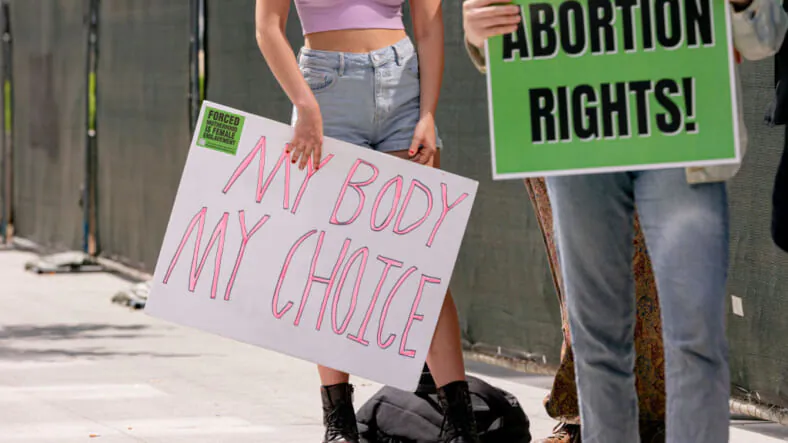The disturbing link between slavery and the overturning of Roe v. Wade
Share
Explore Our Galleries
Breaking News!
Today's news and culture by Black and other reporters in the Black and mainstream media.
Ways to Support ABHM?
By Stephanie Robinson, theGrio
OPINION: Allowing states to make autonomous decisions over a woman’s body is a frightening step back toward the era of bondage that nearly aborted our national democratic experience.

With the recent majority opinion in Dobbs v. Jackson, the Supreme Court overturned Roe v. Wade and Casey v. Planned Parenthood, asserting that a state could determine a woman’s access to an abortion. The decision, penned by Justice Samuel Alito, argued that the Due Process Clause—the basis on which Roe was upheld for 50 years—does not apply to abortion as it has no rooting in America’s national history or culture and, thus, cannot be interpreted as an unenumerated right. According to the high court, states should have the right to determine a woman’s legal access to an abortion based on a state’s own interest.
Disturbingly, such “states’ rights” ideology should sound familiar given it is the same argument used by pro-slavery politicians of the 19th century to perpetuate the bondage of its darker citizens. While the Constitution does leave many decisions to state legislatures, it is fundamentally unfair to allow states to make autonomous decisions over a woman’s body.
In America, our law determines that some rights are so fundamental that they should not be left to the varied politics of individual states given it would tear at the fabric of our nation’s democratic ideals. Freedom from bondage, ultimately codified by the 13th Amendment in 1865, is one such right. The amendment—which establishes that “Neither slavery nor involuntary servitude, except as a punishment for crime whereof the party shall have been duly convicted, shall exist within the United States, or any place subject to their jurisdiction”—is constitutionally unique in imposing a complete bar of slavery because the institution conflicted with other constitutional provisions. Such a unique legal measure was required to ensure that freedom from enslavement was fully enforced and not left to the whims of individual states, particularly given the pre-secession, legislative influence of southern, plantation-based economies.
The freedom to make autonomous decisions over a woman’s own body is another fundamental right that should not be left to the varied politics of individual states. While most abortion debates philosophically consider if a fetus is a full human being, some, like Medium blogger Elle Beau in her May 2019 piece, promote that “existing precedents around body autonomy are infinitely more important” given they are a “critical component of the right to privacy protected by the Constitution.” With a body of applicable case law including Griswold v. Connecticut (1965), McFall v. Shimp (1978), and, until recently, Roe v. Wade (1973), the Supreme Court had ruled and maintained that “competent adults have the right to refuse medical treatment if they so wish; that consenting adults have the right to engage in whatever sexual practices they wish; and that under the due process clause of the 14th Amendment women may terminate their pregnancies before such time as the fetus is viable outside the womb.”
Head over to the editorial about this attack on American freedom.
Lack of bodily autonomy is one way Black Americans are denied freedom.
Check out ABHM’s breaking news section.











Comments Are Welcome
Note: We moderate submissions in order to create a space for meaningful dialogue, a space where museum visitors – adults and youth –– can exchange informed, thoughtful, and relevant comments that add value to our exhibits.
Racial slurs, personal attacks, obscenity, profanity, and SHOUTING do not meet the above standard. Such comments are posted in the exhibit Hateful Speech. Commercial promotions, impersonations, and incoherent comments likewise fail to meet our goals, so will not be posted. Submissions longer than 120 words will be shortened.
See our full Comments Policy here.